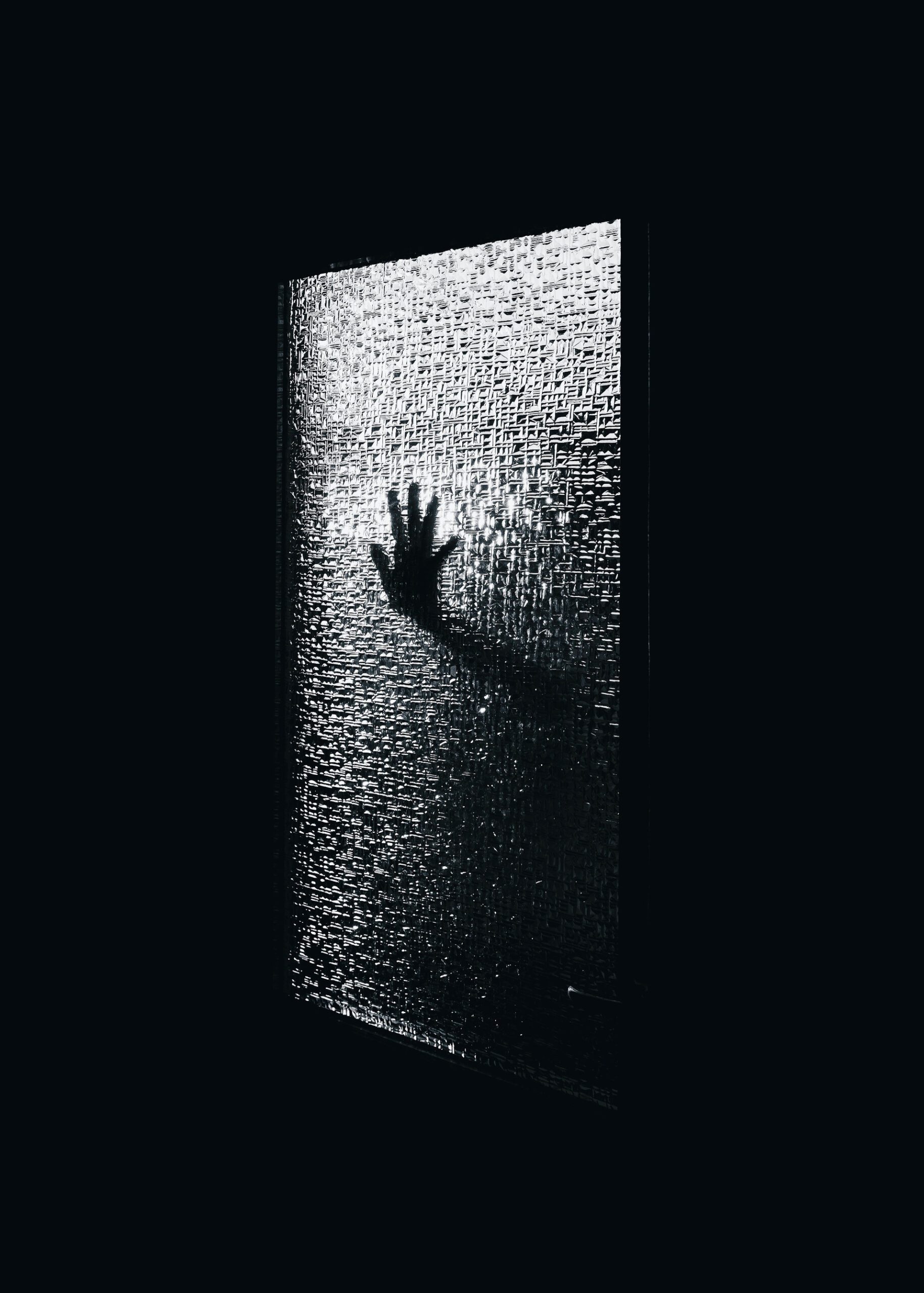
After removing my jewelry an officer delivered me to a stark holding cell, one of several that faced a central desk. I inspected the cell. A small metal toilet crouched directly opposite the door. I thought of the window in the door and shuddered. Cement benches wide enough to function as bunks lined the walls on my right and left. I sat. Hours passed. In shock I waited.
“Come with me,” an officer commanded as she opened the door. I stood and followed. “Stand here,” she pointed to the floor. I stood. Cameras flashed. My misery was immortalized. My frown deepened. “Turn to your left,” came the order. Flash. “Turn right.” Flash. “Come here…Sign here… Place your hand here…” Rituals foreign to me were carried out with practiced speed as officers fingerprinted and catalogued me. I wanted to melt into the floor. I refused to meet anyone’s eyes.
Finished with my mug shot photos and fingerprinting, a female guard ushered me over to receive clothing and hygiene items. I slumped after her. Inside I felt cold and withdrawn, hopeless. With little interest I hefted the blue tub full of necessities now mine and brooded as she escorted me deeper into the building. Several times we paused before heavy metal doors with keypads, awaiting a buzzer entry before going further.
The jail was windowless and quiet, able to house 264 male and female inmates (in separate areas). We stopped at another steel door and waited. A small sally port could be seen through the door’s window. The door buzzed open and I stepped inside, alone. The door shut behind me and another buzz sounded. Another guard clicked the inside door open and I stepped into a living pod.
My eyes roamed the room, absorbing the red cell doors along the walls of the upper and lower tiers, the plastic furniture, a cold cement floor and the room’s 2 other occupants. Despite the jail’s size and attempts at equal gender portioning, the men’s pods overflowed while the women’s single pod often housed only one or two women. Locating my own cell I dumped my belongings on the bed.
Lonely beyond all belief, too sad to cry, it seemed I’d been crying for days. Flopping on the bed, I captured the wall with my stare and memorized every crack in the cement blocks. Life before this day had been busy, busy bringing children to school and sports, working full-time from home, cleaning, cooking and organizing the lives of 7 people. Now I lacked the capacity to achieve quiet calm. My body and mind raged against this enforced seclusion and isolation. I felt contained and constricted, empty and frozen but wanted to act, do something! I lacked the power, the permission.
Over the next few weeks I wrote letters to my children, family, and friends, at times so afraid of the future I had trouble holding the pencil. My family did visit, and often these visits were difficult. After two weeks my husband arrived alone with Vivianne for a special visit with just the three of us. It was a thoughtful thing to do, but it went horribly wrong.
Sitting in a plastic chair in front of a video screen I waited for our visit to begin. The screen came to life and I stared in shock. Vivianne’s long blonde hair was cropped into short bangs and a bob. I had never given her a haircut and her girlish curls had been a source of joy for me after having four boys. “What happened to her hair?” I cried.
Chad shrugged. “I dropped her off at your mom’s house. When I returned your Mom had given Vivianne this haircut.”
Devastated, I sobbed. My nose ran as I rubbed my eyes. Chad and Vivianne sat silently and waited. I grew angry with myself as I began to hiccup. ‘Settle down! Why can’t you have a nice visit with Vivi?’ I angrily thought. Peeking at Vivi I saw her happy face falling. Oh how I wanted to see her smile! Abruptly I ended the visit, fearing my tears would never stop. Returning to my room I hated myself for making my daughter sad.
Angrily I called my Mom the next day, “You cut Vivi’s hair?”
“I don’t know how you can expect other people to care for her with all that hair,” she spouted.
“But I didn’t want it cut. She’s my little girl. Her long hair is precious to me,” I responded in tears.
My mom huffed, “Who cares what you think?” My helpless feelings increased.
A month later my best friend and cousin, Jennifer, came to visit. She wasted no time giving me bad news. “Holly, things at your home are not good at all. I’ve stopped by several times and each time Chad is getting high and playing video games. The house is filthy. He isn’t even buying groceries for the kids. You have to do something!” Jenn told me. Other visitors told me similar stories. I wondered what to do about it.
Chad came to visit a few days later and I mentioned these concerns. He became angry and stormed out. As soon as he made it to the parking lot he called the detective for my case and ranted about me. Things were not better at all.
The pod had a book cart, and reading became my escape. I feared every court date, and as each drew near I’d become terrified. One night while reading in my bunk, concentrating became difficult. My mind kept worrying about the future. I comforted myself with this thought, “Right now I am ok. Yes, something bad may happen tomorrow, but not tonight.” This relieved stress in the moment and helped me to feel safe for small amounts of time.
Three months passed before my husband secured my release on bail. During that time many women revolved through the door of justice. Eliza was the first to demolish my immature views on life, starting with my belief that I was better than people like her. Eliza blew into jail a few weeks after my own arrest. Initially high as a kite, the tall leggy blonde made quite an impression. Over the next few weeks I learned Eliza had been to prison many, many times. She had more children than I, most given up for adoption. Eliza stayed 2 weeks before her own release on bail.
Would you like to play cards?” Eliza asked the room at large. With little else to do I agreed. “My fiancé will be so mad at me,” she bemoaned, twisting the diamond ring on her left hand. Jail rules demanded such an item be removed during intake (I am not certain why but may be to avoid using it as money or a weapon), but Eliza’s hands had been too swollen to remove it. Threats to cut the ring in order to secure its release from her hand had been made. She pulled on it, with no success.
Standing, Eliza began to pace. After only a few strides she relaxed. Returning to the table she retrieved her cards and threw out a king. Her eyes wandered the room distractedly. Ten years younger than Eliza, I did not feel a deep connection to her. I was unfamiliar with her lifestyle, although I sympathized with her struggles.
Christina arrived shortly after. First impressions put her age at a worn-out 60ish. She claimed she had actually been awake for 17 days straight, high on meth. Deep bags under her eyes dragged the rest of her face towards her drooping lips. Even her eyebrows had wrinkles. “Tired” was a step she’d blown past in her desire to earn the merit badge “Awake for 17 days.” Someone told me Chris was only 40 years old; I didn’t believe it. She was also a frequent visitor at the jail, a regular due to her chronic drug use. Christina flung herself into bed and proceeded to hibernate, occasionally accepting food which she devoured like a ravenous animal. Ten days later she emerged from her cell looking 20 years younger and feeling refreshed. No one recognized her.
Another woman arrived, her face a mass of sores and scabs. I overheard her explaining her appearance. “I burned myself while frying food.” The woman next to me, aware of my naivety, leaned over to whisper, “Don’t believe her. That’s meth for you. She’s a picker.”
“What??!” I recoiled. “What do you mean?”
“She’s been picking at her face. She did that to herself. Drugs will do that to you.” Examining the new woman more fully, her wounds did not resemble burns. She left a few days later. And so it went, women coming and going until the day came for Eliza’s release. I’d already heard the phrase, “I’ll write you,” repeated many times by departing inmates to those left behind, catching on that this was a lie, if a well intentioned one.
As Eliza readied to go she turned to me and said, “I’m going to write to you.” Surprised, I searched her face for the reason. At the time, the jail housed about 10 women, and I felt no special connection to Eliza. Perhaps sensing my confusion she clarified, “I know what it’s like to be locked up, how hard it is, how lonely it is. I’m going to write to you.”
Finished packing, Eliza gathered her things and left. Watching her leave, I wondered at her words. Eliza was a stereotypical addict – unstable, unreliable, spacey, her self- described life as messy and destructive. I would have thought her anything but a role model, able to do what others failed to accomplish.
Eliza hitchhiked the two hour drive home from jail. Four days later a guard announced my name at mail call. Amazed, I slid open a purple envelope to reveal a pretty card inside. Eliza’s loopy handwriting greeted me.
Over the next three months no one was more reliable, more dependable, than Eliza. Her letters and cards continued to greet me at least three times a week, every week, until I walked out the door. I am still humbled all these years later. She consistently spent time, money, and energy on me. She expected nothing in return. She was the first unexpected person to treat me thus. She would not be the last.
Discussion Questions:
- Reflecting on the Holly’s feelings of loneliness and hopelessness upon entering jail, have you ever experienced a moment in your life where you felt isolated or confined, yearning for connection and understanding? Are you experiencing these challenges today and looking for help?
- The passage introduces the characters of Eliza and Christina, each with their unique struggles. Have you ever formed judgments about people based on first impressions, and how might this influence our ability to connect with others on a deeper level?
- Explore the significance of Eliza’s commitment to writing letters despite initial impressions of her as unstable. Have you ever been surprised by the support or understanding offered by someone you didn’t expect to connect with?
- Holly notes that Eliza’s letters were consistent and reliable, demonstrating unexpected kindness. Can you recall instances in your life when someone unexpectedly extended support or kindness, and how did it impact you?
- The passage explores the theme of unreliable promises made by departing inmates. Have you ever encountered situations where people’s intentions did not align with their actions, and how did it affect your perception of trust and reliability? Are you struggling today with issues of trusting others?
READ MORE…
- Chapter 1: JAILIntake process at the county jail passed in a blur. Well that’s not exactly true. It dragged on, so boring it became forgettable. An officer transported me by police car from the local police station to the county jail. Hands… Read more: Chapter 1: JAIL
- Introduction: Get to know From Surviving to Living!Click to rate this post! [Total: 0 Average: 0]
- Chapter 2: BAIL, SENTENCING, & PRISON INTAKEReleased on bail after 3 months in jail, Chad arrived to bring me home, telling me in the car, “We’re being evicted and everything has to be out of the house by the end of the day.” At home nothing was packed… Read more: Chapter 2: BAIL, SENTENCING, & PRISON INTAKE
- Chapter 3: GROWING UPClick to rate this post! [Total: 0 Average: 0]
- Chapter 4: ORIENTATION (CHANGE, SHOCK & AWE, SUICIDE WATCH)Part One March 2011 – September 2015 “There is none righteous [none that meets God’s standard], not even one.” ~Romans 3:11 (AMP) “The way of the wicked is like [deep] darkness; they do not know over what they stumble.” ~Proverbs 4:19 (AMP)… Read more: Chapter 4: ORIENTATION (CHANGE, SHOCK & AWE, SUICIDE WATCH)
- Chapter 5: MARRIAGEJust before my 19th birthday, I married Scott, a man I had dated in high school. On a whim we drove to Las Vegas with some friends and got married. My parents were upset by my impulsive decision. They asked… Read more: Chapter 5: MARRIAGE
- Chapter 6: A PADDED ROOM (THE PICKLE SUIT)Suicide watch in Shakopee takes place in the facility’s segregation unit. While inmates are taken to seg for disciplinary reasons, it is also used for suicide watch and health concerns. Soon I would be seeing it for myself. Seven months… Read more: Chapter 6: A PADDED ROOM (THE PICKLE SUIT)
- Chapter 7: WoWAs I waited to be released from seg, I received a kite (internal institutional mail) from the director of Shakopee’s Women of Wellness program (WoW). She invited me to participate in the six week “in-patient” mental health program. I would be transferred… Read more: Chapter 7: WoW
- Chapter 8: RING TOSS & DOPPELGANGERSMy job in General Assembly (Rubber) was housed in a large warehouse building shared by several educational and industry job opportunities. There were 2 main jobs – ring inspections and cutting rubber. I was assigned to rings. Base pay was… Read more: Chapter 8: RING TOSS & DOPPELGANGERS



















